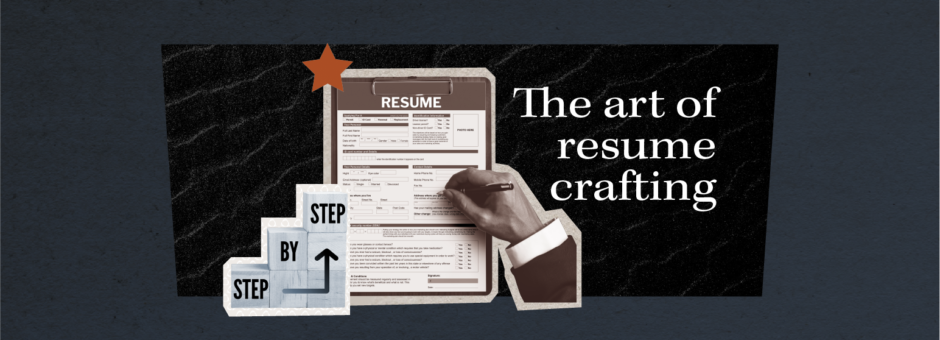Related:
Unlock Job Offers with Smart Reference Choices
In the current job market, where competition is fierce and recruiters often sift through scores of applications, the significance of an outstanding resume cannot be overstated. As a vital tool in your job-seeking arsenal, your resume is more than a mere chronicle of your professional journey; it’s a strategic document that, when crafted astutely, can dramatically enhance your chances of landing your dream job. Let’s delve into the art of resume crafting, focusing on key aspects like company-specific customization, the balance between detail and brevity, the impact of formatting, and the inclusion of achievements and hobbies.
Researching the Company and Tailoring Your Resume
The first step in crafting your resume is a thorough investigation of the company and the role you aspire to. Why? Because a one-size-fits-all resume is a relic of the past. In today’s competitive job market, customization is key.
Ensure that your summary and objective reflect the position and company you’re applying for. At Goldbeck Recruiting, we will still receive resumes for one type of role, such as a sales position, with a summary that indicates another type of position, such as operations, is being sought.
“There is nothing wrong with simultaneously seeking different types of positions,” says Goldbeck Recruiting President Henry Goldbeck, “but it’s important to customize your resume in each case.1
Your work history should also be customized to emphasize the achievements and experience that are most relevant to the position you’re applying for. If your job search stimulates memories of additional relevant experience, continue adding them to your resume.
Understanding Company Culture and Relevant Skills
Begin by immersing yourself in the company’s culture, values, and mission. This information, often found on the company’s website, social media, and recent press releases, will guide you in aligning your resume to their ethos.
Your research will also give you a sense of the backgrounds shared by the company’s employees. Browse those in positions similar to the one you’re applying for. What courses and technologies are listed on the profiles? What professional groups do they belong to? Note their career progression within the company as well as the values they express.
Research any trends that emerge. Can they be added to your resume? Are you prepared to speak to these skills and values during a job interview? If not, develop a plan to learn them in order to become a more attractive candidate.
Analyzing the Job Description
Next, scrutinize the job description. Identify keywords and phrases that highlight specific skills or experiences the employer values. These keywords should be seamlessly integrated into your resume, ensuring that it passes through Applicant Tracking Systems (ATS) and catches the recruiter’s eye.
Updating Your Resume is Easy
Goldbeck says that applicants will benefit from taking a few moments to refresh their resume, not only for each job type, but for each application. With company information available online and the ability to easily edit your resume, he believes there’s no reason for failing to do so.
“It’s not like the boomer days when we had to go to the public library to research a company, then write our resumes on a typewriter, starting from scratch each time we had a typo,” he jokes.
Striking the Right Balance: Detail vs. Brevity
When it comes to the content of your resume, the debate between detail and brevity is ongoing. The golden rule? Be concise yet comprehensive.
Keep your resume as substantive as possible: what you’ve done, how you’ve done it, how well you’ve done it, and how it relates to the responsibilities at hand.
Avoid fluff. ‘Fast learner’ and ‘great people skills’ are resume cliches. Far better to show examples of learning, teamwork, and leadership experience.

Highlighting Key Achievements
Instead of listing every duty from past roles, focus on your achievements and the impact you made. Use quantifiable data where possible. For instance, “Increased sales by 20% in Q1 through strategic marketing initiatives” is more compelling than “Responsible for sales activities.”
Relevant examples include:
- Experience with technologies
- Initiatives, responsibilities, and projects undertaken
- Number of customers you were responsible for
- Products of expertise
Dedicate some time to reflecting on your career. Keep a journal with your experiences and achievements. You may have forgotten valuable accomplishments and skill sets.
Limiting Length
Aim for a one-page resume if you’re early in your career, and a maximum of two to three pages for more seasoned professionals. This constraint forces you to prioritize the most relevant and impressive information.
“Employers are looking at a lot of resumes and they just want the facts,” says Goldbeck. “Where did you work, for how long, what did you do, and what did you achieve,?”
Senior Recruiter Vanessa Cox has been pleased to see more focused resumes in general but notes that exceptions are not rare.
“I recently had a candidate ask me whether he should use the 19 page version of his resume or the three page version,” she recalls. “Clearly it’s the latter.”
The Power of Formatting and Attention to Detail
A recruiter’s decision to read your resume is often made in mere seconds, and a cluttered or difficult-to-read document can be promptly discarded. A well-formatted resume can make the difference.
Consistency and Clarity
Use a clean, professional layout with consistent fonts and sizes. Bullet points aid in making information digestible. Leave enough white space to prevent the document from appearing overcrowded.
Proofreading
Attention to detail is important. Proofread your resume multiple times to avoid typos and grammatical errors. These mistakes can be interpreted as a lack of professionalism or attention to detail. Some employers will discard a resume if there is a single typo.
Importance of Formatting Limited
While formatting and attention to detail are important, it’s still the facts that matter most.
“If you have the skills and experience we’re looking for, you can afford to make somea lot of mistakes on your resume,” admits Goldbeck. “On the other hand, if you’re not qualified, it won’t help if you have the most perfect resume in the world.”
Goldbeck notes that formatting is most relevant for borderline candidates.
“If you don’t have the direct experience, it’s important to highlight indirect experience,” he says. “If you present that properly, you might get a second look. You’ll get 30 seconds instead of two.”
Including Achievements and Hobbies
Finally, let’s address the inclusion of achievements and hobbies. While there is some grey area here, it’s generally agreed upon that achievements and hobbies should be included only if they are distinct or speak to your character.
“If you have achievements or accomplishments that aren’t common that’s fine to include, but if you’re simply listing things that anyone can say, it’s not a good idea,” says Executive Assistant Ciaran Henderson.
Playing or coaching sports at a semi-professional level can be indicative of a competitive nature. Not-for-profit experience speaks to leadership, teamwork, and empathy.
“If they’re relevant or speak to your personality, great, but if your resume simply says that you like reading or going to the movie theatre, that’s not worth including,” says Senior Recruiter Alessia Pagliaroli.
Conclusion
In conclusion, a well-crafted resume is a strategic blend of in-depth company research, a balance between detail and brevity, meticulous formatting, and the thoughtful inclusion of achievements and hobbies. Remember, your resume is your personal marketing brochure; it should not just tell who you are, but also sell why you are the ideal candidate for the job.
Embrace the process of crafting your resume as an opportunity to reflect on your professional journey and articulate your future aspirations. With these guidelines, you’re well-equipped to create a resume that not only stands out but also strategically positions you for success in your job search.
Cited Sources
1 Direct communication with Henry Goldbeck and other members of the Goldbeck Recruiting staff




